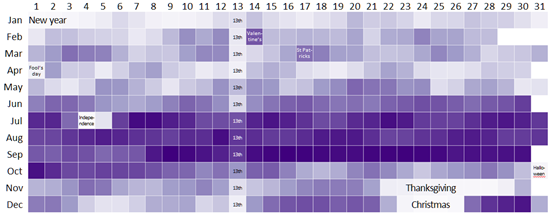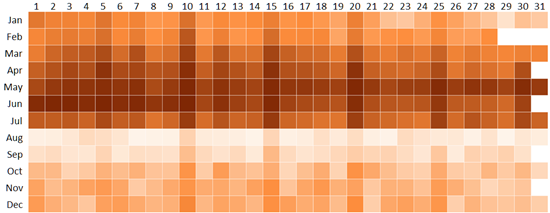This visualisation shows the popularity of birthdays in the US between 1973 – 1999. The darkness of the colour shows the rank of how popular that birthday is. Dark colours are more popular (i.e. better ranked) birthdays.
- Most people are born in August & September (and therefore were conceived around November & December, during the holidays, perhaps?)
- However, very few people are actually born during holidays – New year, Independence day, Halloween, Thanksgiving and Christmas. (People don’t like to spoil their holidays?)
- Few people are born on the 1st of April. (You don’t want your kid born on Fool’s Day)
- Few people are born on the 13th of any month. (Unlucky?)
- Plenty are born on Valentine’s Day and St Patrick’s day
We tried to see what this looked like in India.
Based on school registration data for ~700,000 students born between 1992 – 1995, here’s what it looks like. (Click for a larger version.)
This shows a number of bizarre patterns:
- Almost everyone’s born between May and June – just before the school opens.
- Almost no one is born in August – after school opens.
- An unusual number of people have round-numbered days as birthdays – 5th, 10th, 15th, 20th, 25, and 30th. (This round-numbered pattern was also seen when we analysed utility fraud).
- January 1st is fairly popular. Other than that, none of the holidays seem to have an effect.
In fact, these results are so striking that we are tempted to believe that the popularly accepted proof for a person’s age – their Class 10 certificate – generally bears a convenient fiction created for the purposes of school admission several years ago.


Good analysis Naveen….This data is certainly powerful and useful for pharma companies, hospitals, kids related shopping etc..to plan their inventory, operations, manpower etc much better…
The myth of even birthrate all along the year is clearly defeated here. Kudos to you and your team in carrying out this analysis.
@Gramener
Can you tell me how taxes can affect the Birth dates in U.S?
What’s the primary reason behind this?
@Bharath: If a child is born in Dec 2011, the parents get a full year’s tax benefit for 2011, and only incur child-raising costs for 1 month. If a child is born in Jan 2011, they still get the same benefit, but the child-raising costs are for 1 full year. So there’s an economic incentive to bear children in December. Amitabh’s paper (linked above) demonstrates evidence for this.
Good one! This one shows how powerfully and crisply visualisations can deliver insights. Inspires me to attempt some 🙂